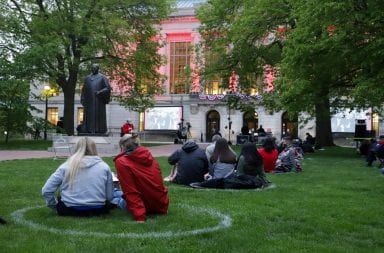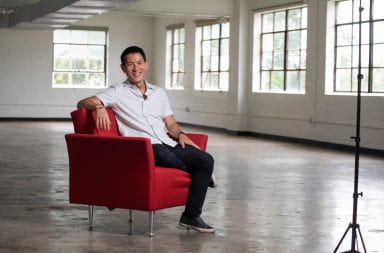While the prospect of leasing out the parking assets at Ohio State to a private vendor is an option at this point, officials say that the decision has not been made yet.
Geoff Chatas, chief financial officer of the university, told The Lantern Thursday that the proposal is now in the second phase of a five-phase plan.
“We’ve had spirited dialogue so far (with students and faculty), this process is just beginning, a lot of people thought that this decision has been made,” Chatas said.
Chatas said phase one of the plan was an initial analysis of parking assets at the university, and a rough estimate of vendor minimums. He said there were really two options when it came to investing in the core of the university — leasing, and selling.
“We spent the last year looking at various options,” Chatas said. “Selling assets that are a core part of our campus is a tricky one.”
Chatas said after analysis, the university decided that a lease of parking operations would be the best way to go forward.
“How about if we look at the option of leasing the operations of the parking garages and all the parking operations,” Chatas said. “What if we go out and find out if there are investors who are willing to enter in a long term relations with Ohio State to run the parking and to pay us up front for the ability to do that.”
While Chatas would not discuss specifics on the level of interest, Chatas told The Lantern there is a considerable level of interest.
“This accomplishes two things. It gets us the funds up front, which we can then reinvest in our students and our faculty,” Chatas said. “It allows us to structure a transaction with an operator that will give us flex and will allow us to make certain things happen over time.”
Chatas said the decision to lease the parking assets, rather than selling them, gives the university more control of the situation. Chatas said they have negotiating powers with snow removal, repainting lines and routine maintenance.
Phase one of the five-phase plan also calls for approval from the Board of Trustees for the university. The Board approved the analysis and approved movement to phase two on Sept. 9.
Phase two, which officially ends Wednesday, was the issue of a Request for Qualifications. The RFQ called for all eligible vendors to submit interest and to be a part of the bidding process. The final day to submit for the RFQ is Wednesday.
The university has formed a group called the Parking Advisory Group, to assist Chatas in the decision-making process of the parking privatization idea.
The group consists of Chatas, who will chair the group; Christopher Culley, general counsel for the university; Robert Schottenstein, a university trustee; Jim Rathman, Faculty Senate chair; Nick Messenger, president of USG, Heather Link, chair of the University Staff Advisory Committee, Larry Anstine, chief executive officer of The Ohio State University Hospital, Javaune Adams-Gaston, vice president of Student Life, Vijay Gadepally, a graduate student representative; Brad Harris, senior fiscal officer from the College of Arts and Sciences; and Bruce Weide, from the Faculty Senate Fiscal Committee.
Chatas said that between now and early 2012, this committee will explore different needs and concerns from all the different areas of the university before officially submitting a Request for Proposal — phase three.
Chatas said these proposals will be very specific on how the companies will utilize the parking assets, how much they will charge for parking, what kind of maintenance they will perform and how much they are willing to pay for it.
“The minimum bid has to be $375 million,” Chatas said. “We also didn’t want to have bidders come in bidding more than 50 years.”
Chatas said after evaluating the cost of parking from the past 12 years they found that from 1999 to 2010, the cost of parking rose 7 percent. From the last 10 years, Chatas said the cost of parking on campus has risen 5.4 percent.
Chatas said the proposal will limit the outside vendor to raising the cost of parking by 7 percent over the next 10 years. After that, the vendor will be limited to raising by 4 percent, or the cost of inflation, whichever is higher.
Some students have expressed concerns about the raising of parking prices.
Laura O’Donnell, a fourth-year in political science, is concerned that parking permit prices are expensive as of now and is concerned about possibly raising them.
Messenger said a big part about going forward in this process is informing everyone of the proposed changes. Messenger said he answers emails from students addressing some rumors they’ve heard about the parking privatization.
“(The emails) said, ‘oh I heard we’re selling our parking, I heard parking permits are going to increase by 20 percent,’ so kind of correcting the rumors and saying, ‘no, they’re not going by 20, they’re going to go by 7.5 max,’ which you know, still is a lot,” Messenger said.
Chatas said all the plans of the vendor will be included in their respective RFP’s, and at that point, a decision will be made of whether to move forward or not.
Messenger expressed concerns about the operations of the Campus Area Bus Service. Chatas told The Lantern the money from the vendor will be put into an endowment, which will then pay for the CABS program, and then some.
Messenger was not convinced the endowment would have enough return to independently run the CABS program.
“We don’t want to be 15 to 20 years into the parking agreement and realize we don’t have any money for CABS, so at that point, if we ran out of money, we’d have to dip back into the general fund,” Messenger said.
Chatas said the return of the endowment has traditionally been around 15 percent, and with those kind of numbers, would be more than enough to fund the CABS program.
Gordon Aubrecht, a physics professor and president of the American Association of University Professors chapter at OSU, said that many faculty members are concerned about the more-current issue of a lack of communication between the committee and the university community.
“There was really no discussion with faculty staff or students about this before they took it to the board of trustees. So you have to ask yourself, ‘What is it, why are they reluctant to do this?,'” Aubrecht said.
Aubrecht said at the AAUP meeting Oct. 6, some faculty members questioned if the university had fully researched the idea of privatizing parking.
“It appears from what’s been going on that really the university did not study what (Traffic and Parking) actually does before they had this idea to take it to the board of trustees,” Aubrecht said.
While Chatas said the university spent nine months researching the prospect of, Aubrecht said there is much more that needs to be assessed.
If the decision is made to move forward with the lease, phase four of the will involve selecting an operator and financing partner. Chatas said this phase will begin in the spring.
He said at this point, the university will begin to make the contract with the vendor chosen, and work toward closing the transaction. Chatas said the new vendor taking over operations, if everything is approved on time, will begin by next summer.
Chatas said the biggest thing through all of this is to make sure that the service does not change, and that people are not negatively affected.
“We want to make sure that whoever runs our parking does it in a way that it is as good or better than it is today,” Chatas said.


